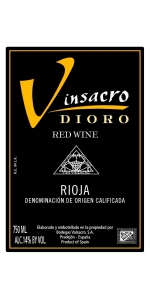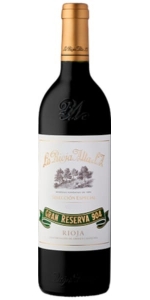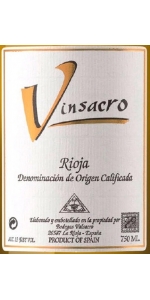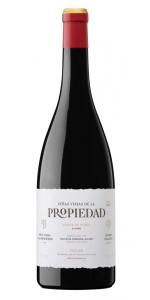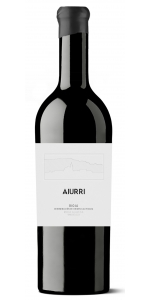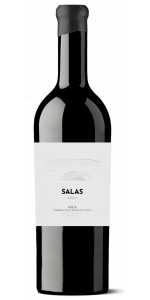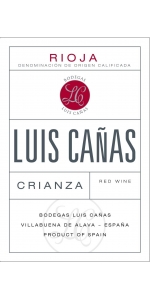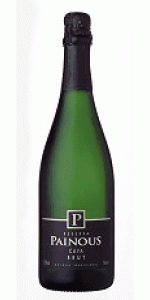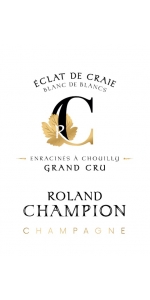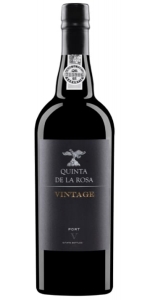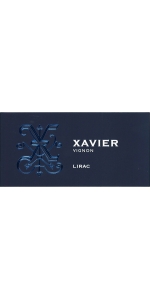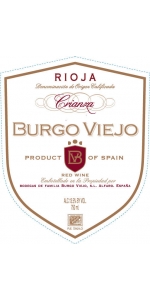Vinsacro Dioro Rioja 2015
| Country: | Spain |
| Region: | Rioja |
| Winery: | Valsacro |
| Grape Type: | Tempranillo |
| Vintage: | 2015 |
| Bottle Size: | 750 ml |
Dark ruby color. Aromas of cherry, currant, vanilla bean and hint of tar. Full-bodied, with flavors of cherries, cocoa powder and oak. A touch of sweetness on entry with a little bit of air with soft tannins that are starting to integrate well.
The latest step in the project is Vinsacro (formerly Valsacro) Dioro. The earlier Valsacros were made from a field selection of the older vineyards. Now, thanks to the new facility Amador has been able to build an upmarket version of Vinsacro (formerly Valsacro) with a four-stage selection process that includes an initial field selection of the fruit followed by a second table selection as the grapes come into the winery. After fermentation wine from selected tanks is transferred to new French oak barrels for 12-14 months of barrel age. Finally, the best barrels are set aside for Dioro and the remainder used to "upgrade" the normal Vinsacro.
Vinsacro Dioro is a blend of grapes from 100+ year old "vidau" vineyards where many varieties were planted together in the same plot.
Today the grapes are harvested and vinified separately. The final blend depends on the vintage but typically it's Tempranillo (50%), Garnacha (20%) and remaining 30% is a mix of mainly Graciano (10%) & Mazuelo (10%) with a little of Monastrell (5%) & Bobal (5%).
Review:
"The 2019 Vinsacro Dioro Selección is a Vidau field blend sourced from Monte Yerga in Rioja Oriental. Aged for 18 months in French and Eastern European oak barrels, it is only released after five years in the cellar. Dark garnet in color, time in the glass reveals soy sauce, bay leaf and thyme notes, along with black fruit and chutney-like undertones. Dry and rich on the palate, it flows with softened tannins and a clingy mouthfeel, lingering long with an impression of tomato leaf. This is a complex, nuanced and solar red that will warmly captivate your palate."
- Antonio Galloni's Vinous (April 2024), 94 pts
La Rioja Alta Gran Reserva 904 is made from 90% Tempranillo, 10% Graciano
The 2015 Gran Reserva 904 Tinto offers great aromatic complexity, with notes of wild strawberry, red cherry, plum, blackberry and cranberry combined with aromas of tobacco, brioche, ground coffee, caramel, cedar and cinnamon blossom. The alcohol and acidity are elegantly balanced on the palate and its polished, gentle tannins and freshness provide a smooth and refined mouthfeel. Fine, delicate and very long aftertaste, that will continue to be rounded with time in the bottle, making this new Gran Reserva 904 a wine with great cellaring potential.
Especially recommended with all kinds of meat and stews, seasoned fish and desserts with chocolate or red fruit toppings. Perfect as an after-dinner drink.
Review:
A perfumed nose of plums, mulberries, mushrooms, caramel, sweet tobacco and sweet spices. Full-bodied with velvety, fine tannins and lively acidity. Balanced and supple with a creamy texture. Delicate and precise with a long, polished finish.
- James Suckling 97 Points
Vinsacro Rioja Blanco is made from 60% Chardonnay, 40% Viura.
Aged 7 months in oak barrels of 225 liters
The grapes come from vineyards located in Grávalos, on the southern slopes side of Mount Yerga at the foothills of the “Cordillera Ibérica” at an altitude of between 700 and 800 meters. A very high located area where you obtain fresh wines with little graduation, with very fine and elegant aromas.
Bright straw yellow color, intense aromas and elegance with outstanding floral and fruity notes. After some time in glass balsamic and spicy aromas with toasty notes rise, due to aging in oak and bottle maturation. Very cool and structured with an unusual power for a white with a variety of flavors ranging from citrus to balsamic. A white wine that is full of surprises and capable of taking on many years in the cellar.
Vinsacro white has a long aging potential and presumably will have a positive development for 20 years.
The Chardonnay grape is harvested during the second or third week of October. The Viura grape in the first two weeks of October.
The collection of the grapes is done manually.
The selected must will go through the fermentation in American oak barrels of 225 liters with medium toast, remaining in the barrel with its lees for seven months before being removed with a daily battonage, daily at first and then more sparingly.
Pairs great with roast lamb, grilled vegetables.
Rioja Oriental is blessed with a warm, dry Mediterranean-influenced climate (unlike Rioja’s west, where the climate is more continental). The soils, formed by carbonate sedimentation with diverse colluviums containing deposits of volcanic ophite, quartz, and sandstone, covered with carbonate clay, sand, and silt. At varying depths, there is a poor, cold horizon containing petrocalcic calcium (calcium carbonate) with a distinctive white color—this is prized by many for its ability to impart a mineral-driven finesse to the wine.
Rioja’s eastern-most district is often described as flatter than its western counterpart but make no mistake—there is significant elevation here. The grapes for Propiedad represent the pinnacle expressions of Palacios Remondo’s terroir and come from three estate vineyards: Las Mulgas, Valviejo and Corral Serrano Viejo.
The soils between 0.5 and 2 meters thick are from the Quaternary Period, formed by carbonate sedimentation with colluviums of very diverse origin, containing volcanic ophite, quartz, sandstone, etc. covered with carbonate clay, sand, and silt. The exposure is east/northeast on the Yerga Mountain slopes with vineyard heights reaching between 400-640 meters (1,321-2,099 feet) above sea level with a vine age of 30-94 years old. The grapes were harvested between Sept. 28th and Oct. 6th.
The grapes were destemmed, crushed, and fermented with native yeasts in wooden vats with gentle cap immersion. Maceration took place over 35 days followed by spontaneous malolactic fermentation in barrel. Aging was 10 months in fudres and bocoyes (wooden cask) followed by fining but no filtration.
Propiedad is quite elegant but has remarkable concentration. Dried herbs, strawberry, blueberry, and baking spices ripple over subtle earthy notes and fine-grained tannins. The palate is seamless and beautifully balanced, sporting a mineral verve and seductive mouthfeel. Will age beautifully for a decade or longer.
Review:
Nose: red fruit, ripe fruit, expressive, dried herbs, wild herbs. Mouth: tasty, full, good acidity. , aromatic, varietal
-Guia Penin 95 Points
A blend that is unique in Rioja, this combines mostly Garnacha with around 7% of Tinto Velasco, Graciano and Bobal, all sourced from a six-hectare parcel on the Monte Yerga. Rich, dense and concentrated, with remarkable intensity, focus and balance, nuanced oak and a fine, refreshing finish. 2020-28
-Tim Atkin 95 Points
The old-vine Garnacha 2017 Propiedad was produced with grapes coming from organically farmed vineyards in Las Mulgas, Valfrío, Valviejo and Corral de Serrano in Alfaro, vineyards that are organically farmed. The destemmed and crushed grapes fermented in oak vats with indigenous yeasts and the wine matured in larger oak vats (mostly 5,000-liter) for 12 months. It has the Mediterranean profile of the vintage with some jovial notes of orange peel and red cherries intermixed with aromatic herbs. The palate reveals fine-grained, slightly dusty tannins. The palate has more freshness than what you expect from the notes on the nose. This wine has a good evolution in bottle even in warmer years like this or 2015.
-Wine Advocate 94 Points
A super elegant and silky Rioja with delicate red fruit and milk chocolate aromas, rather than the blueberry and bitter chocolate of so many modern wines from here. Lingering, filigree finish that draws you back to the glass.
-James Suckling 94 Points
Aiurri Rioja is made from 80% Tempranillo, 15% Grenache, 5% Graciano.
Chalky, mineral and pure, with blood orange and blackberry fruit and scented oak. "Aroma: Complex and intense, where black fruits accompany spicy notes, highlighting black pepper and licorice. In the background, the notes of aging appear, with tones of dry tobacco and leaf litter. Taste: Powerful wine with good structure, but at the same time with notable freshness. It generates very pleasant and elegant tactile sensations. It is a wine where balance, concentration and sensations of fullness prevail. Color: Deep cherry color with a high layer."
Review:
"A superb first release from Ribera del Duero-based Pago de Carraovejas, Aiurri is effectively a village wine from Leza, using grapes from seven parcels in the village. Structured, layered and refreshing, it's an organically farmed field blend of Tempranillo with small amounts of red and white grapes. Chalky, mineral and pure, with blood orange and blackberry fruit and scented oak. 2025-32."
- Tim ATKIN (Rioja 2024 Special Report), 94 pts
Aiurri Salas Rioja is made from 80% Tempranillo and 20% Field Blend
Aroma: Very expressive on the nose, with good complexity, red fruit and fresh black fruit, spices and wild herbs. Flavor: Combination of freshness and complexity. Pleasant tannins, lots of fruit, long finish with great persistence. Color: Black Cherry with a Violet rim.
Review:
"A peppery Rioja that shows the graciano and monastrell touch to the field blend. Menthol, basil leaves, laurel, blackberries and a lot of spices. Tense and powdery tannins on the fine-boned, full-bodied palate. Drink or hold. - Zekun Shuai (Senior Editor)"
- James SUCKLING (September 11th 2024), 94 pts
Dark ruby color. Aromas of cherry, currant, vanilla bean and hint of tar. Full-bodied, with flavors of cherries, cocoa powder and oak. A touch of sweetness on entry with a little bit of air with soft tannins that are starting to integrate well.
The latest step in the project is Vinsacro (formerly Valsacro) Dioro. The earlier Valsacros were made from a field selection of the older vineyards. Now, thanks to the new facility Amador has been able to build an upmarket version of Vinsacro (formerly Valsacro) with a four-stage selection process that includes an initial field selection of the fruit followed by a second table selection as the grapes come into the winery. After fermentation wine from selected tanks is transferred to new French oak barrels for 12-14 months of barrel age. Finally, the best barrels are set aside for Dioro and the remainder used to "upgrade" the normal Vinsacro.
Vinsacro Dioro is a blend of grapes from 100+ year old "vidau" vineyards where many varieties were planted together in the same plot.
Today the grapes are harvested and vinified separately. The final blend depends on the vintage but typically it's Tempranillo (50%), Garnacha (20%) and remaining 30% is a mix of mainly Graciano (10%) & Mazuelo (10%) with a little of Monastrell (5%) & Bobal (5%).
Review:
"The top of the range is the 2015 Vinsacro Dioro, a wine that is only produced in excellent vintages. It's a blend of 40% Vidau (the old field blend) plus 45% Tempranillo and 15% Mazuelo, from a slope in the south of the Monte Yerga called Cuesta la Reina, from a big, 120-hectare plot that has been with the Escudero family for generations. It fermented with indigenous yeasts in stainless steel with a long maceration. It matured in new French (70%) and American oak barrels for 18 months. It's still very young and a little shy, with a reticent nose where the lactic and spicy aromas are intermixed with earthy and dark fruit aromas. The palate is full-bodied but perfectly balanced, compact, powerful and serious, with abundant tannins, extract and clout. This should develop nicely in bottle, given its stuffing and balance. An excellent, modern version of a classical Rioja. 20,000 bottles were filled in June 2017. - Luis Gutierrez"
- Robert Parker's Wine Advocate (Issue #235, February 2018), 92 pts
"(sourced from a 100+ year old plot of mixed varieties; aged in new and used French oak barrels for 14 months) Deep, bright-rimmed ruby. Ripe black and blue fruits on the expansive, spice- and smoke-accented nose, along with suggestions of vanilla, candied flowers and cola. The oak qualities recede quickly on the palate, which displays sappy, deeply concentrated boysenberry, black raspberry and spicecake flavors that show a suave blend of richness and energy. Supple tannins build steadily on the penetrating finish, which leaves cherry-cola and baking spice notes behind. - Josh Raynolds"
- Antonio Galloni's Vinous (February 2019), 93 pts
"I loved the 2015 Vinsacro Dioro Rioja, and this beauty is 50% Tempranillo, 20% Grenache, 10% each of Mazuelo and Graciano, and the balance Mourvèdre and Bobal, all of which spent 12-14 months in French oak. It boasts a deep ruby/purple color as well as smoking good notes of black currants, dried herbs, licorice, and background oak. Medium to full-bodied, seamless, and layered on the palate, with terrific fruit and impeccable balance, I suspect it will shine for over a decade."
- Jeb Dunnuck (March 2019), 93 pts
The Valsacro Estate
The Escudero family has been making wine and growing grapes for generations in the rugged, semi-desert foothills around Grávalos in the southwestern corner of the Rioja Baja region. Over the last 15 years or so, the Escudero brothers led by Bordeaux-trained winemaker Amador have transformed the small family "bodega" into a major Rioja wine producer. The changes have come gradually and in addition to the new winery at Pradejón (near Calahorra) they have greatly extended vineyard acreage, a very successful "cava" sparkling wine venture (one of the few non-Catalonian cava makers), and extensive Chardonnay plantings (disallowed in Rioja, but OK for cava). Amador, now in his mid-forties, is not one to shy away from taking risks to make things happen. The Valsacro project is an excellent case in point.
"One of the most adventuresome of "new Rioja" producers; amazing Dioro selection has explosive fruit; new project in Navarra called Logos bears watching."
- Anthony Dias Blue's pocket guide to wine 2006
The Valsacro Vineyards
Operating from the small Grávalos facility, Amador realized that some of his vineyards offered the potential to do something better (and different). These old vineyards, some over 100 years planted in the old fashioned "vidau" style offered the kind of raw material needed to make a modern-style premium wine - a Rioja with a difference. ["Vidau" is a mixed variety vineyard - a field blend ready to pick.] The vineyards include Tempranillo, Mazuelo, Graciano & Garnacha. A typical Valsacro is about 40% "vidau" (majority is Garnacha with Tempranillo & Garnacha), 50% Tempranillo from 28 year old vines and 10% Mazuela (Carignan) from 25 year old vines.
Luis Canas Rioja Crianza is made from 95% Tempranillo and 5% Garnacha
A classic style Rioja from one of the regions most enduring family run wineries.. The hillside terraced vineyards are sheltered by the Sierra Cantabria Mountains to the north from harsh weather extremes. Small plot production is utilized in this region of infertile chalky clay soil to produce clusters of excellent quality. Almost 900 plots are needed to complete the approximately 400 hectares of estate-owned or cellar-controlled vineyards, some with vines more than 100 years in age.
Tasting notes
Made from 95% Tempranillo, 5% Garnacha of 30 years of age, the wine shows a ruby red color, a clean nose with nuances of balsamic, plum and cedar. The palate is smooth and velvety, complex and structured, with fruit, spice flavors with toasted oak. A pleasant finish with red fruits and hints of eucalyptus.
The harvest
This year in Rioja Alavesa the weather has been especially cold, the summer short and dry, and there has been plenty of rain in early September. This has produced wines with great aromatic notes, particularly those coming from high altitude areas, very fragrant and with great structure.
Winemaking and aging
Upon entering the bodega and passing the selection table, the grapes are de-stemmed and crushed before undergoing fermentation and then maceration in stainless steel tanks for a total of 8 days, obtaining better color extraction as well as much more complex wines, suitable for prolonged aging. The wine is clarified with vegetable gelatines and follows anicrobic filtration.
It is ideal to pair with meats; red meat, poultry, small game, oily fish, semi-cured cheeses, spicy dishes and hot dishes such as beans or potatoes Rioja style.
After its primary fermentation, the wine is placed in barrels where it undergoes malolactic fermentation and is aged for a minimum of 12 months. It is then bottled for at least another 12 months.
Grape varieties: Parellada 40%, Macabeo 30% and Xarel·lo 30%.
Harvest: Occurs in 3 stages. Macabeo within the first fortnight of September, Xarello during the second fortnight in September and Parellada within the first fortnight of October.
First fermentation and vinification: This is a "Methode Traditionnelle" with
soft pressing of the grapes to obtain 60% of the must (flower must). It is decanted and fermented with controlled temperatures of 18ºC for 20 days until it fully develops the primary aromas of the grapes.
Secondary fermentation: takes place in the bottle for 40 days at a temperature of 16ºC and final ageing for 20 months. Residual sugar: 7 gr. per litre.
Color: Pale yellow with green tones. Shiny and clear.
Aromas: Powerful in the nose, clean. Ageing aromas.
Taste: Soft and well structured, long aftertaste and good balance of acidity and sugar contents.
Gastronomy: It should be served chilled between 5ºC and 7ºC. A flute type glass is recommended. Excellent with pasta, red and soft meats and white fish.Painous is unique in that it is a Cava-Joven style sparkling wine, meaning, the wine receives the minimum aging of 9 months. This allows crisp, fresh aromas and flavors to be expressed. It is delicious for aperitif.
Review:
"Golden straw color. Aromas and flavors of brown butter poached pear, marzipan, lemon and apple, and floating in the pool with the grill going with a round, crisp, finely carbonated, dry medium body and an interesting, medium-length finish manifesting notes of dried apples, apricot jam, blanched almonds, and jasmine rice with no oak flavor. Layers of flavor from fruit to earth dance on the tongue for a classic expression of sparkling wine from Catalonia."
- Beverage Testing Institute (November 2022), 91 pts - Gold Medal
Roland Champion Champagne Blanc de Blancs NV is aged for minimum 30 months (the minimum for NV is 15 months). This cuvee is made from 100% Chardonnay and is produced from the free run juice only. The current release is the result of the blend of the 2005, the 2006 and the 2007 vintage.
Fresh and delicate, its fine bubbles and wide range of aromas will be perfect as an aperitif. This Champagne will also match very well with seafood and shellfish.
dosage : 8 grams per liter
ageing : 30 months on laths
Even if it doesn't say on the label, 100% of the production is RD (Recently Disgorged)
Total Production for this Cuvée : 1,500 cases (9 liter equivalent) per year
Reviews:
"Golden yellow color. Lively, fruity, toasty leesy aromas of honeyed brioche and apple tart with a satiny, tangy, dry-yet-fruity medium body and a sleek, interesting, snappy lemon curd, nougat, and chalk finish with silky, soft, fruit tannins. A classic example of blanc de blanc champagne, delicious."
- Beverage Testing institute , 93 pts
"Spiced with ground anise and ginger accents, this offers notes of poached pear, lemon meringue pie, hazelnut and stony mineral. Very elegant and well-meshed throughout, with a silky finish. Tasted twice, with consistent notes. 1,500 cases made. –AN"
- Wine Spectator 92 pts
"This cuvée made from 100% Chardonnay offers a fresh aromatic nose of light toast, dried yellow fruit and nuances of yeast. On the palate it has a creamy mouth feel of toasted nuts and rich autolytic notes. This is a beautiful wine, rich and complex."
International Wine review 92+ pts
"Small grower. Autumn fruits dominate the aromas of this wine, which is blatantly more like a wine than we normally expect a champagne to be. Some may find that unexpected and even off-putting, while others will find it intriguingly delicious."
- Washington Post - EXCELLENT
"Roland Champion is a small family-owned producer, now with the fourth generation, in the village of Chouilly (”shoo-ee”), which has only Grand Cru vineyards. Made from 100 percent chardonnay grapes, this Champagne offers ethereal grace and poise and harmony; if I were fighting a duel tonight, I would ask for this Champagne as my last beverage. The nose here is about the richness of warm biscuits and hazelnuts, dried fruit and spice, like a Platonic, ineffably light fruitcake; in the mouth, however, it’s about a structure that encompasses an incredible marriage of power and elegance, like the delicacy and strength of the finest bone china. And there’s something porcelain-like about this Champagne, in its notable crisp, lively character, its transparency and its slightly chalky, shale-like mineral elements. Forget the Champagnes that come on with heavy toasty, caramel qualities; here, instead, is a wealth of subtlety and nuance touched with a racy, dynamic edge. Exceptional."
Biggerthanyourhead.net
Opaque color. Very rich, dark chocolate aromas with some black cherry and mature fruit coming through. There is also a pleasing freshness to the port originating from its floral and cistus (rockrose) bouquet. The Quinta de la Rosa Vintage 2017 is a powerful wine with much potential but at the same time elegant and generous on the palate. Full of flavors, very complex with fine tannins that gives the wine a nobility and persistence. A great vintage made to give pleasure now and in the next few decades.
Review:
The 2017 Vintage Port was bottled a few weeks before tasting after spending 18 months in used tonels. It is a field blend, mostly Touriga Nacional and Touriga Franca, coming in with 98 grams per liter of residual sugar. Wonderfully aromatic and filled with flavor, this got plenty of aeration and didn't blink even a little. It was still vibrant and expressive. Aeration only made it more tannic. It is also delicious. This is potentially a great Port, and it seems like the best I've seen from La Rosa. This is sort of approachable in the near future, but it really needs (at least) a decade of cellaring. It has a lot of muscle and should age well.
-Wine Advocate 95 Points
Very floral in profile, with violet and lilac accents leading off, followed by a decidedly red-fruit spectrum of raspberry, cherry and red currant coulis flavors that race throughout. Has grip, but this is more reliant on acidity, showing a nearly piercing feel as the tightly focused finish zips along, leaving a mouthwatering impression. Delightfully idiosyncratic. Best from 2033 through 2050. 112 cases imported. — JM
-Wine Spectator 95 Points
This is a rounded Port, showing layers of black fruits, ripe tannins and spice. At the same time, it does have a solid structure that will allow it to age. The acidity comes through at the end. Drink from 2028.
-Wine Enthusiast 95 Points
Xavier Vignon Lirac Rouge is made from 80% Grenache and 20% Syrah.
Ripe fruit, ranging from raspberries and cherries to hints of stone fruit. Yet, it's not over the top or simply fruity. This full-bodied wine adds hints of leather, garrigue and licorice along the way, evolving from creamy to velvety on the palate and through the lasting finish.
Pairs with lamb Tagine with dry fruits - Duck breast fillet with green pepper sauce - BBQ Prime rib of beef.
Review:
"An 80-20 blend of Grenache and Syrah, Vignon's 2019 Lirac is drawn from multiple parcels with galets roulés over clay soils. Roughly one-third went into oak, while the rest stayed in tank. It may be the most complex of the various Vignon "Signature" offerings, marrying hints of garrigue and licorice with mixed berries and hints of oak. It's medium to full-bodied, silky and forward, with the same lip-smacking drinkability factor that marks all of Vignon's wines on the finish. - Joe Czerwinski"
- Robert Parker's Wine Advocate (September 2020) 92 pts
Burgo Viejo Rioja Crianza is made from 90% Tempranillo & 10% Graciano.
Red ruby colored wine with violet tones; well-balanced, black fruit, vanilla and coconut flavors. Powerful, complex and silky smooth...classic old style Rioja at a bargain price.
- back
Louis Jadot Nuits Saint George is made from 100 percent Pinot Noir.
The Nuits-Saint-Georges A.C. wines are produced on land delimited by the parishes of Nuits-Saint-Georges and Premeaux-Prissey. The soils are basically composed of limestone and marl. A perfect exposure to the east gives the capacity to produce splendid wines. The grapes bear small little dark red berries. The bunches are destemmed; they macerate in open vats during 4 weeks helping this subtle terroir to reveal itself. After devatting, the wines are aged in oak barrels during 18 months.
Pairs with roasted salmon, roasted chicken, grilled red meat : beef, lamb chops, osso bucco, stew, ragout, bœuf bourguignon, duck, partridge, quail, deer, young wild boar, teppanyaki beef, mashed potatoes with salted butter, Cîteaux, Mont d’Or.
Review:
"A dark, blackberry- and black cherry–laced red, with earth and iron accents, a reserved character and a dense structure. Oak spice elements emerge on the lingering finish. Best from 2022 through 2033. 400 cases imported."
-Wine Spectator 90 Point
Arzuaga Gran Reserva 95% Tempranillo, 4% Cabernet Sauvignon and 1% Merlot.
Presenting a ruby red color, this wine has a wide range of aroma of ripe fruit compote, toast, and leather. Fine, complex, and attractive with a great balance. Silky and pleasant in the mouth with a bit of spice detected in the finish.
Serve with red meats, roasts, or game dishes. Its flavor is enhanced with cured or fatty cheeses.



